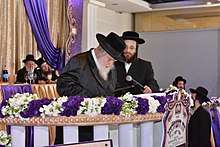Moishe Sternbuch
| Rabbi Moishe Sternbuch | |
|---|---|
|
Seated are Rabbi Moishe Sternbuch (right) and the Kaliver Rebbe (left) | |
| Position | Rabbi |
| Synagogue | Gr'a Shul of Har Nof |
| Position | Ra'avad (rosh beis din) |
| Organization | Edah HaChareidis |
| Personal details | |
| Born |
1928 London |
| Denomination | Haredi Judaism |
| Residence | Har Nof, Jerusalem |
| Parents | Osher Sternbuch |
Moishe Sternbuch (also written Moshe / Moses Shternbuch, Hebrew: משה שטרנבוך) is a Haredi rabbi who serves as the Vice-President of the Rabbinical Court[1] and the Ra'avad (Chief) of the Edah HaChareidis in Jerusalem. He resides in Har Nof where he is the rabbi of the local GR"A Synagogue, named after the Vilna Gaon of whom he is a direct descendant.[2]
Early life
Moishe Sternbuch was born on 15 February 1928 (24 Shevat) in London, one of 9 children of Osher Sternbuch, an Orthodox Jewish merchant, and Devorah. His parents hosted numerous rabbis who came to London to raise money for their yeshivas, among them Elchonon Wasserman, who after learning with Moishe declared that he was a davar sheyeish bo mamash (a boy of substance). He was tested in learning every Shabbat by Yechezkel Abramsky, who predicted he would one day become a moreh hora'ah (posek). Before long he was known as the Londoner Illui (prodigy).[2] Osher died in 1939 at the age of 39, leaving behind his eldest child of 14 years, the 10-year-old Moishe, and the youngest only two. In 1940, Moishe entered the Toras Emes yeshiva in Stamford Hill, of which Moshe Schneider was the rosh yeshiva, where he would remain for ten years.[3] He studied there with Bezalel Rakow, who was later to become the Gateshead Rov,[4] Yitzchok Tuvia Weiss, his future colleague in the Edah HaChareidis, and future Olympia and York businessman Paul Reichmann.[5]
World War II
-Inscription inside volume of Noda Biyhudah presented to Sternbuch by Eliyahu Eliezer Dessler upon his Bar Mitzvah[6]
Sternbuch's family fled London during World War II due to The Blitz. They moved to a small nearby village where he shared a room with Eliyahu Eliezer Dessler, author of Michtav me-Eliyahu, who predicted that Sternbuch would someday be one of the gedolei hador (greatest of the generation).[6]
Due to the increasing threat of a Nazi invasion of Britain, Sternbuch's mother made attempts to arrange his safe passage to Canada or the United States. She asked Elyah Lopian, a rosh yeshiva from the East End of London, for advice on whether or not to allow her son to board what was to be the last passenger ship sailing for America till the war's end. Lopian offered to perform a goral haGra to divine the move's possibility for success , but as he was unable to accompany the solemn ceremony that day with the required fasting, the ship departed without Sternbuch, only to sink with 300 children aboard.[6]
Eretz Israel

After the war, Sternbuch decided to travel to the Land of Israel via France and Italy to study the Torah as taught in the Brisk yeshiva. He enrolled in the Hebron Yeshiva, simultaneously cultivating relationships with leading rabbis Yitzchok Zev Soloveitchik (in 1952), Avrohom Yeshaya Karelitz and Dov Berish Weidenfeld, all of whom he used to meet with regularly in their homes.[7]
Sternbuch subsequently took up a position in Johannesburg, South Africa. He was very involved in outreach, including his noted lectures to those in the medical field.
He strongly opposes the Zionist State of Israel and was against its establishment. Holding a high position of authority in the anti-Zionist Edah HaChareidis, he is of the view that there is no connection between the existence of a Jewish state whatsoever and the beginning of the redemption of the Jewish People to the Land of Israel which will precede the Messianic Era.
Works
- Shternbuch, Moishe. Moadim Uzmanim (in Hebrew). Nesivos HaTorah VeHaChesed. - Commentary on the Jewish holidays
- Shternbuch, Moishe. Ta'am VeDaas Al HaTorah (in Hebrew). Jerusalem, Israel. - Commentary on the Torah
- Shternbuch, Moishe (2001). Haggadah Shel Pesach: Ta'am VeDa'as (in Hebrew). Jerusalem, Israel. - Commentary on the Passover haggadah
- Shternbuch, Moishe. Teshuvos VeHanhagos (in Hebrew). - Questions and answers on the Shulchan Aruch
- Shternbuch, Moishe. Chochma VeDaas (in Hebrew).
- Shternbuch, Moishe. HaDerech LiTeshuva (in Hebrew).
- Shternbuch, Moishe. Birkas HaChamah (in Hebrew).
- Shternbuch, Moishe. Erev Pesach SheChal B'Shabbos Ve'Purim Me'shulash (in Hebrew).
- Shternbuch, Moishe. Orchos HaBayis (in Hebrew). - Laws of the home
- Shternbuch, Moishe. Rav Moshe Speaks.
- Shternbuch, Moishe. Commentary on the Shev Shmaytsa (in Hebrew).
- Shternbuch, Moishe. Hilchos HaGr"a U'minhagav (in Hebrew). - Laws and customs of the Vilna Gaon
- Shternbuch, Moishe (2007). Stam Ke'Hilchasan (in Hebrew). Jerusalem, Israel. - Laws of writing a sefer torah, tefillin, and mezuzah.
- Shternbuch, Moishe. A Voice in the Darkness Harav Moshe Sternbuch Speaks on Contemporary Issues (In English). Jerusalem, Israel: Feldheim. ]
- Shternbuch, Moishe. Talks on the Weekly Sedra, Taste and Know (In English). Jerusalem, Israel. ]
- Shternbuch, Moishe. Laws of Jewish Family Life Laws Niddah (In English). Jerusalem, Israel. ].
References
- ↑ Yated Ne'eman: 1, 2, 3, 4, 5
- 1 2 Frankfurter 2018, p. 42.
- ↑ Yated Ne'eman: 1; 2
- ↑ Deiah veDibur:The Gateshead Rov
- ↑ Frankfurter 2018, p. 44.
- 1 2 3 Frankfurter 2018, p. 46.
- ↑ Frankfurter 2018, p. 48.
Sources
- Frankfurter, Yitzchok (28 March 2018) "From One Generation to Another: A Conversation with the Renowned Posek and Rosh Beis Din of Yerushalayim Rav Moshe Sternbuch", Ami Magazine. Issue 361, pp. 42-68.